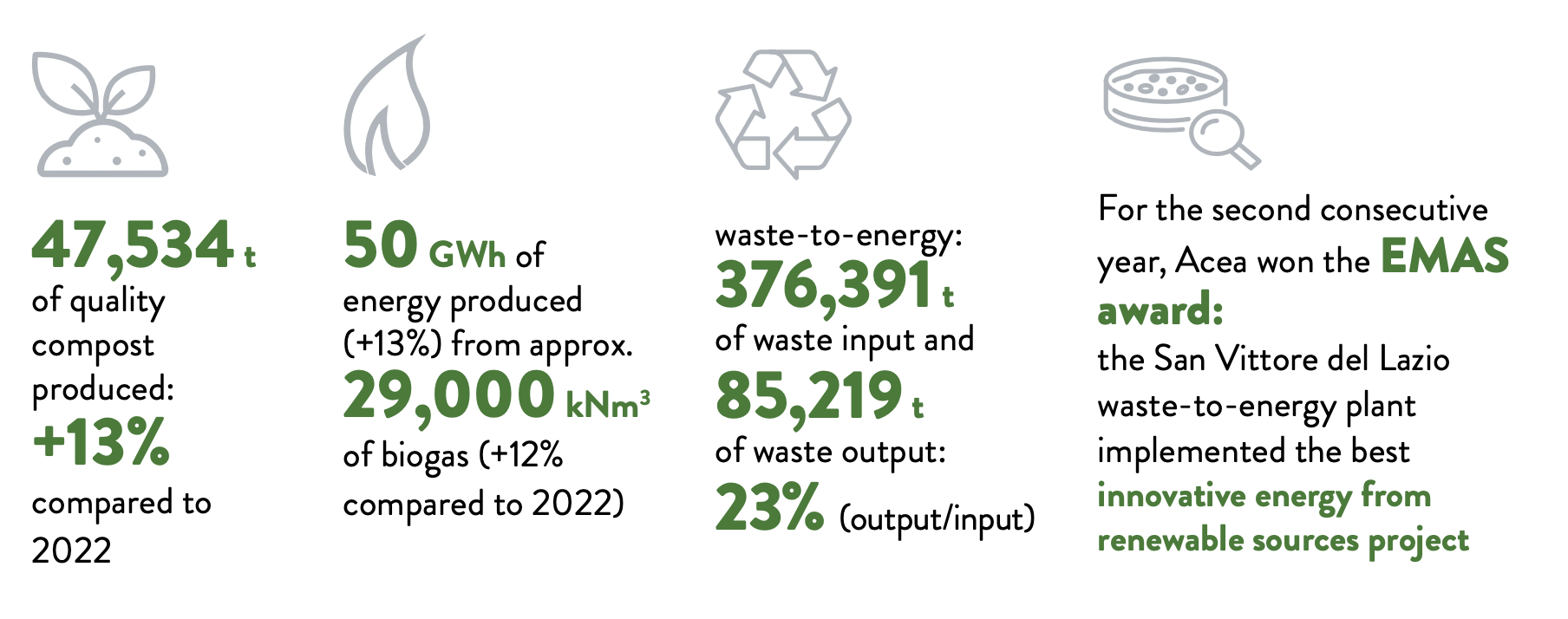Environment segment - Overview
SCOPE
The chapter includes Acea Infrastructure for the Smart Comp project; the activities of the waste-to-energy plants and compost production plants, all falling under Acea Ambiente; the activities of
Orvieto Ambiente (part of Acea Ambiente until 2022); the activities of Aquaser, di Acque Industriali, Berg, Demap, Deco195 and Ecologia Sangro since 2023.

Acea has continued to expand its capabilities in management of the final part of the waste cycle, for optimised recovery, recycling and reuse and, where possible, recovery of energy. The Group manages the following activities: the treatment of municipal solid waste (MSW) and other types of waste (such as green waste from separated waste collection, industrial waste, etc.) for the recovery of material and disposal of residual materials in landfill, the storage, selection, sorting and separation of multi-material waste originating from separated waste collection, such as plastic and metal packaging, for subsequent recovery, the treatment of liquid waste such as leachates and liquid sludge, waste-to-energy that recovers the energy portion of the waste and reduces the landfill required for disposal, and the production of high quality compost for agricultural use.
The management of solid and liquid waste is performed at plants using advanced technology and in recent years, in order to improve and renew processes and increase recovery of materials and/or energy, some of them have been upgraded or expanded.
The Companies that operate in that area conduct research, also in collaboration and partnerships with university institutions and companies operating in the circular economy field. Included in this context is the Acea Smart Comp local composting activity carried out by Acea Elabori.
The Acea Smart Comp project continued in 2022 with the support from the University of Tuscia and Enea. Going beyond the logic of waste transition, since 2020, the project has proposed a new organic waste management model that shifts management in large plants to decenyralised waste management. This project, which has enabled the Company to become organic waste free and patent the control system for electric composters, involved several different companies. In fact, the technology adopted involved areas such as wireless sensor technology, involving partnerships with start-ups such as Nature 4.0, air filtration with photocatalysis, automated bin rotation, with an integrated waste weighing system, predictive maintenance, which involves hardware that can be installed on Smart Comp systems to interface with an IoT platform, and optical waste recognition, which involved a partnership with Keybiz to define the algorithms and process the video streams. The project also involves the strategic introduction of the solution into the new concept of circular communities and smart apartment buildings. In this regard, pilot projects were launched on different types of potential circular communities, or community aggregators, such as barracks, parishes, district markets and universities.
During the Ecomondo event, Acea Ambiente presented various plastic recycling initiatives, including the innovation plant currently being constructed in Cittaducale designed to sort and recover plastic waste from separated urban waste collection (for more details see the "Ecomondo" box in the Environmental Sustainability and the Main Challenges chapter).
The following paragraphs provide further details of operational aspects of activities in the circular-economy field.
195 Deco also manages other plants that have merged directly into the company Acea Ambiente. For more details, see Integrated waste treatment.